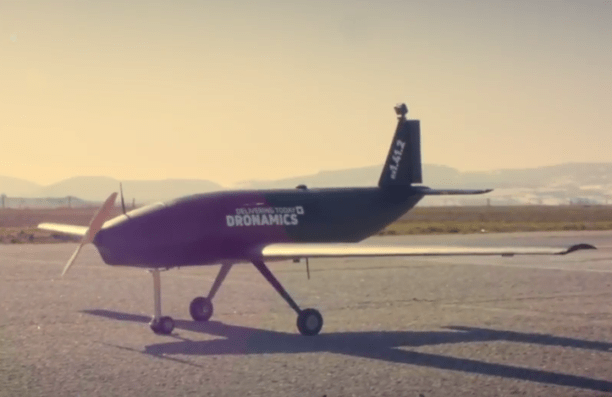
Drone delivery typically refers to small, lightweight items. On the useful side, blood and vaccines: on the commercial side, burritos and Slurpees. But DRONAMICS has another view and a broad goal.
“Our mission at DRONAMICS is to democratize airfreight and lower the cost of shipping in emerging markets,” says the company website. “To achieve this, we are developing a new type of cargo airplane – small, unmanned and extremely fuel efficient. It can transport 350 KG over 2,500 KM for a cost that’s 50%+ lower than other airplanes. It flies autonomously, can be monitored and managed remotely via satellite, and the whole system costs less than a sports car.”
“At first, it didn’t sound possible, but we keep proving it is, which is why we’ve called it “The Black Swan”. It can land on short and unpaved runways, enabling on-demand point-to-point flights and speedy same-day delivery even to the most remote locations that would otherwise take days to reach over ground or sea. “
“Most small delivery drones are an attempt to solve the last-mile problem,” Svilen Rangelov says, quoted in a recent article in WIRED magazine. “They are the bike messenger, we are the cross-country truck.”
The company has won awards, partners and customers for its innovative vision. It’s a vision that includes the use of domestic “droneports” and unmanned traffic management systems: in the same way that Zipline is revolutionizing the logistical problems of delivering healthcare to remote or underserved areas, DRONAMICS is revolutionizing cargo transportation.
“We are starting with domestic air networks in African, Asian and Latin American countries with fleets of the Black Swan, taking advantage of the multitude of small airfields that are often unused, training local personnel as drone and logistics operators, and partnering with local industry to provide a valuable lifeline of getting goods in and out of small, remote, mountainous and/or island communities within hours at a cost that is often below even road transportation,” says the company.
It’s an idea that could fundamentally change the shipping industry – and whole economies, which is the company goal. By rethinking the scale and capabilities of drone technology, they just might succeed.
Miriam McNabb is the Editor-in-Chief of DRONELIFE and CEO of JobForDrones, a professional drone services marketplace, and a fascinated observer of the emerging drone industry and the regulatory environment for drones. Miriam has penned over 3,000 articles focused on the commercial drone space and is an international speaker and recognized figure in the industry. Miriam has a degree from the University of Chicago and over 20 years of experience in high tech sales and marketing for new technologies.
For drone industry consulting or writing, Email Miriam.
TWITTER:@spaldingbarker
Subscribe to DroneLife here.